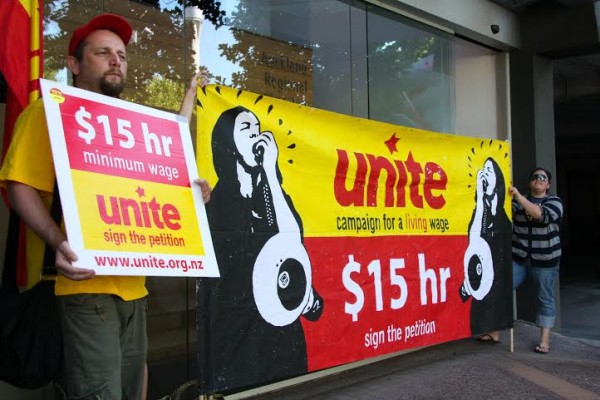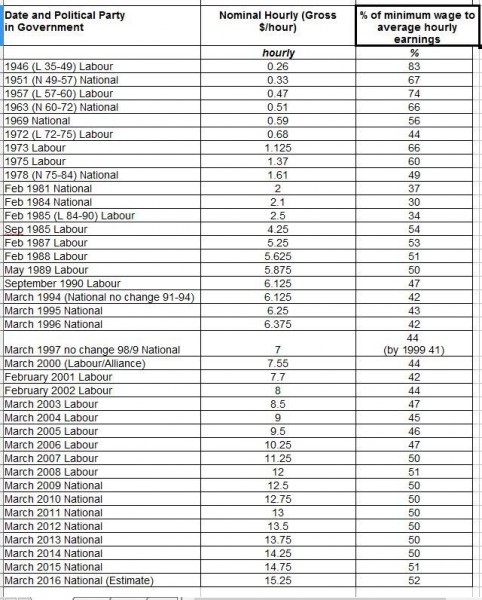
The ideological battle over having a minimum wage as a floor for workers wages has been won.
Unlike previous National Party governments, this one has made no attempt to reduce it real value during this term in office.
Instead, we have the spectacle of a right-wing party hailing the fact that they have “increased the minimum wage every year since coming into office, from $12 to $15.25. This is an overall increase of 27% compared to inflation of around 11%.”
The Prime Minister John Key confirmed on television that they had maintained its level at about 50% of the average wage for adults.
This level had been reached in 2008, the final year of the outgoing Labour government.
The National Party has traditionally not ben a fan of minimum wages. The Act Party allies of National do not believe there should be a minimum wage at all.
Even prior to the 2008 election the National Party’s industrial relations spokesperson was saying that they would not be “relying on this artificial solution of having an arbitrary level of what some people think is a fair wage and some people think is not.”
When it was first introduced in its modern form in 1946 the level was 83% of the average wage.
It stayed at a level of two-thirds of the average wage or above right through to the mid-1960s. National then allowed a decline to 44% by 1972.
Labour was elected that year and boosted the minimum to 66% again by 1973. It remained at 60% when National was elected again in 1975. A new decline then set in until a record low of 30% was reached in 1984.
Labour again restored some of the loss, reaching around 50% for most of the term of the 1984-1990 Labour government.
The 1990 to 1999 National government only increased its level once in nine years. This allowed the minimum wage to drop to around 40% of the average wage. Labour again increased its real value between 2000 and 2008 when the minimum again reached 50% of the average. The then Prime Minister Helen Clark said she was “comfortable” with that level for the future.
When National was elected in 2008, Unite Union was fearful that the National Party government would revert to norm and start reducing the value of the minimum wage. Many of the start rates in our collective agreements are connected to the minimum wage. That is why we launched a nationwide campaign over 2009-2010 to raise the immediate goal to a $15 minimum wage. This received huge support. 200,000 people signed our petition. Opinion polls showed 61 percent support by January 2010.
In my view, this has been an important reason National have not been able to attack the real level of the minimum wage.
Now the government is reduced to arguing that while 50% may be OK if they increase the real value of the minimum wage above that level it will result in job losses.
These predictions are based on a right-wing neo-classical economic “theory” that has no basis in reality. It is more akin to a religious dogma which is held by right-wing theorists to justify their pro-big-business stance. In their world view, any real wage increase (especially a regulated one not produced by magical market forces) will lead to job losses.
That is why for decades the right wing economists have argued that any increase in the minimum wage will lead to an increase in unemployment.
That is why the Act Party opposes a minimum wage. It violates their religious beliefs.
The labour Department half admits that this dogma is not based in reality in its “Regulatory Impact Statement” from 2010 when it says:
“The estimates of constraint on job growth are based on a neo-classical model of firm decision-making, whereby firms operating in perfectly competitive markets adjust output and inputs, including labour, in response to relative prices. This modelling approach does not adequately reflect the dynamic nature of employment responses to changes in minimum wages, and, in particular, any investments that employers may make to increase the productivity of low paid workers. One consideration for the impact on the demand for low wage workers is how minimum wages change relative to average wages. If minimum wages keep pace with average wages then we would expect to see little change in the relative demand for low-wage workers or low-wage jobs.”
The Organisation for Economic Cooperation and Development (OECD) was a true believer in this dogma for many years. However, at least since 2006 when they did a comprehensive review of the research that existed, they have had to admit that “no significant direct impact of the level of the minimum wage on unemployment is identified.” (OECD Employment Outlook, Chapter 7).
If you look at the actual history of economic trends in this country there appears to be an opposite relationship. Unemployment soared when the minimum wage was frozen during the early 1990s. Unemployment fell radically during the early 2000s when the minimum wage was being increased significantly in real terms.
Even the scenarios used by MBIE don’t seem that scary. The 50 cent increase to $15.25 from April 1 this year is expected to affect 152,700 people directly with no negative impact on employment.
A forecast increase to $16.05 would have affected 267,200 people with possible job losses – if you accept their dogma – of 5,500. An increase to $19.25 would have directly assisted 555,900 people with a possible job loss of 28,000. That is approximately 0.13% of the workforce, which is in the realm of the margin of error.
Current CTU policy is for a minimum wage of two-thirds of the average wage and for that level to be indexed in law. The law protects National Superannuation payments which are indexed so that the couple rate is at least 66% of the net average wage. There is no reason economically why the minimum wage could not be returned to that two-thirds of the average wage level.
According to Statistics New Zealand figures, the current average wage is $29.38. Two-thirds of that level is $19.59.
An increase in the minimum wage to this level was supported at the last election by Labour, the Greens, NZ First, the Maori party and the Mana Movement. I hope the same promise can be obtained from all five parties before the next election.
The current level still means that someone working a 40-hour week is only $610 before tax. Tens of thousand of workers have no guaranteed hours in their contracts and work fewer than 40 hours a week.
Working people need a big increase in the minimum wage just to survive.
We also need a genuine end to zero-hour contracts which is also looking a little more likely – a topic I will return to next week. There is not much point in earning a higher hourly rate if we are stuck begging for hours.
Big increases in the minimum wage are more likely to affect who receives income. There will be a shift between wages and profits. There will be a reduction in inequality. There will be an improvement in living standards for working people.
Those are all worthy objectives. The decade of the 1990s saw real wages fall significantly and have not returned to their previous level. The wage share of GDP was reduced by about 10%. Billions of dollars a year have been taken out of working peoples’ pockets and put in the hands of the rich.
We deserve better.
Making the minimum wage a living wage is a good start.







I know it’s difficult, but there is some impact on international competitiveness from wage levels. Had we a competent government they would move to remove GST instead of wage increases – a greater local effect, and one which improves competitiveness without reducing standard of living. This is true of all the ‘user pays’ reforms – from public transport prices to electricity. Sensible governments do anything including subsidising these to reduce cost of living and the necessity for wage increases. Gibbering idiots like the Key government, that can’t so much as balance a budget will of course do none of these. And so we are reduced to pursuing wage increases. Just another failure from team Key.
Yes, but often not for the reasons people assume. Baring businesses on a razor edge margin (especially things like the Restaurant industry), the reason increasing minimum wage can increase unemployment is due to the increased benefit of automation. If you have to pay more for your workforce, the upfront costs of automating jobs becomes less of a stumbling block.
But the opposing force is that we are yet to see a machine work through an earthquake autonomously
Prove it!
Seriously, just quoting economic theory is irrelevant. Empirical examinations do NOT show a direct relationship between Minimum Wage levels and unemployment.
Match Zero Hour minimum wage contracts for workers, with “Zero Salary Contracts” for government cabinet ministers and caucus.
“Zero Salary Contracts” for Cabinet Ministers, paid retrospectively based on the quality and benefit of legislation they pass, based on an annual citizens referendum on their performance.
In any case just to be fair, a minimum wage cost of living stipend should apply. Backhands from Lobyists would result in immediate dismissal from power.
Any cost associated with the referenda would be offset by use of money.
I’ve costed this, and concluded it would result in lower unemployment, higher wages, less poverty, and better social services, and an increase in GDP of up to 30% over current projections over the next ten years. This estimate is at least 80% more accurate than those made by National in regards to the TPPa.
[…] minimum wage – The living wage is $19.80 – let’s push for $20. The arguments for increasing it outweigh the negative. People spend that money directly into their neighbourhoods, small business will benefit from more […]
I the “living wage” is $19.80, why aren’t those on less dying?
News flash: they are. Child mortality rates have never been as high under this government
Andrew wouldn’t be interested: he doesn’t read real news, only National Party spin because that’s all he needs for a comfortable satisfied life in Sleepy Hobbiton.
Because “Living” now includes an annual overseas holiday on the Gold Coast.
For you perhaps. Most of us just have enough to pay our f..n bills. Take your arrogance where it belongs – Whaleoil or http://www.upmyself.com
If people don’t insist they get their already-paid-for-via-historical-taxes infrastructure back and purge our lands of the banks then no matter how much you get an hour? You will have it taken away from you.
Chasing after any ‘higher minimum wage’ is an undignified embarrassment and I find it cringeworthy.
They’re just laughing at you as you struggle.
As Leila Harre was saying on National Radio on Sunday morning, many of our industries are now manned by obedient migrant workers (scabs) eg fishing and horticulture. Industries such as mining and forestry work have high injury rates. Our aged care sector is dominated by big business such as Ryman Healthcare.
Education services is trumpeted as our number 3 export earner, but in reality many of these students go awol and work in the horticultural or restaurant sector undermining our minimum wage laws.
Comedian Steven Joyce boasts that we have a “services surplus” with India. (Aspirational foreign students are a great way to keep our low income workers obedient and earn the government money) 🙂
Comments are closed.